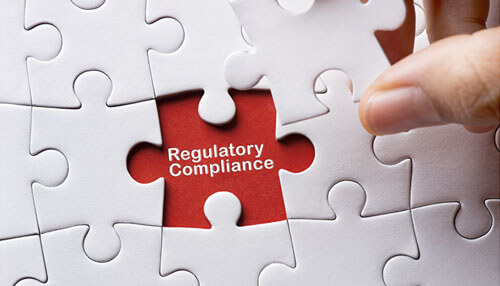Government regulation is a controversial phrase. For consumers, regulation shows that government agencies are interested in preserving their safety and security. Yet, for business leaders, regulation is a major hurdle they must leap over before achieving business success. For entrepreneurs, regulation is particularly daunting. Often, to be compliant with existing regulations, organizations must invest in specific tools and processes, which can dramatically increase the overhead of launching a startup. Yet, most entrepreneurs have little choice over the industry in which they operate, so what are they to do when their startup must maintain compliance amidst intense regulations?
Invest in Effective RegTech
Many entrepreneurs are tempted to handle regulatory compliance themselves, especially at the very beginning of launching a startup. At the start, a startup will have few compliance concerns, which might be easy for a business owner to understand and manage. Yet, assuming full responsibility for regulatory compliance for one’s startup is a massive mistake.
As a business grows, an entrepreneur’s responsibilities multiply — and so, too, grow issues associated with regulatory compliance. Typically, a business leader’s limited time and energy is best spent on tasks that improve business processes and bring in more revenue. While maintaining compliance does provide an organization with value — in reducing liability for fines and sanctions while building greater consumer trust and respect — it is not usually the most efficient project for the business’s most important executive.
Thus, from the jump, entrepreneurs in industries known for heightened regulation should devote some resources to technology solutions that assist with regulatory compliance — otherwise known as RegTech. In particular, startups benefit from tools developed for regulatory change management, which help organizations maintain compliance as their structure grows and shifts, as startups are known to do. With the right RegTech, entrepreneurs will know that their businesses will have a dramatically lower risk of non-compliance, freeing them up to focus on more exciting and more pressing matters.
Find a Pro-business Legal Team
Lawyers are not always the most creative professionals, but entrepreneurs looking to navigate the complex world of regulatory compliance need to assemble a legal team capable of developing creative solutions to compliance concerns. The right legal professionals will have a mix of local and national experience in the regulatory space, so they will be capable of keeping regulators at every level comfortable with business policies and procedures.
Finding a pro-business legal team will not be easy, but it is essential for launching a startup to get success in heightened regulatory environments. Entrepreneurs should leverage their network, drawing upon their investors and advisors to find highly skilled and qualified legal counsel with experience in the entrepreneur’s specific discipline. Because the risk of non-compliance tends to be high, business leaders need to be certain that the legal advice they receive is applicable in their domain.
Scale Responsibly
The larger a business becomes, the more attention it will receive from regulatory bodies. While most startups are subject to the same regulations as major corporations, they tend to experience less scrutiny from regulators as any non-compliance from a startup has a limited impact compared to an organization with many thousands of workers and millions of customers.
Undoubtedly, growth is important to a startup, which needs to increase in size to survive and thrive. However, entrepreneurs must be careful with how they scale, ensuring that they remain compliant even as they grapple with more data, more customers, more business partners and more. Again, RegTech is an essential resource in scaling a startup, but younger organizations in highly regulated industries might also want to hire dedicated risk and compliance professionals.
Professionals in the risk and compliance space are experienced in monitoring business policies and processes to identify risks to compliance. Often, they work with business management to make changes that reduce risk and keep regulators happy. Most risk and compliance officers have high moral and ethical standards, as they must to help an organization remain compliant with regulations.
Conclusion
Launching a startup is not a startup for long; if it succeeds, a startup will become a small business and perhaps even a medium or large organization. Unfortunately, in an industry subject to heavy regulation, organizational change like this can be dangerous. From the very beginning of their business planning, entrepreneurs in regulated industries need to accept that they will need help managing their regulatory compliance.



